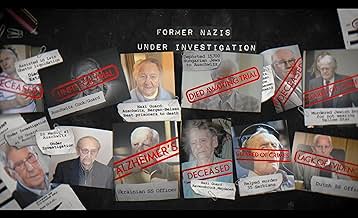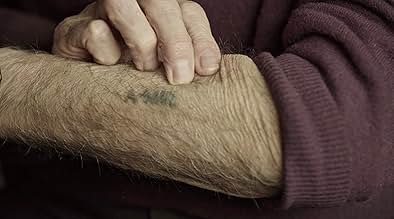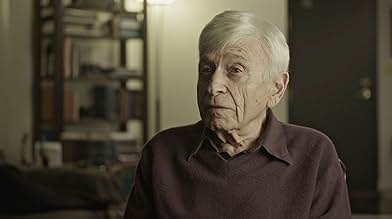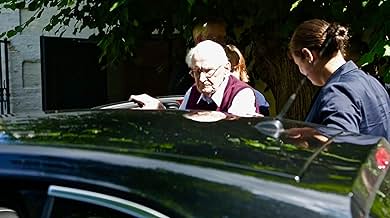The Accountant of Auschwitz
- 2018
- 1 Std. 20 Min.
IMDb-BEWERTUNG
7,3/10
3142
IHRE BEWERTUNG
In diesem berührenden Abenteuer, einem Remake des beliebten Films von 1940, ignorieren zwei Jungen aus Georgia ihre Rassenunterschiede und bilden gemeinsam einen Jagdhund aus.In diesem berührenden Abenteuer, einem Remake des beliebten Films von 1940, ignorieren zwei Jungen aus Georgia ihre Rassenunterschiede und bilden gemeinsam einen Jagdhund aus.In diesem berührenden Abenteuer, einem Remake des beliebten Films von 1940, ignorieren zwei Jungen aus Georgia ihre Rassenunterschiede und bilden gemeinsam einen Jagdhund aus.
- Auszeichnungen
- 7 Gewinne & 5 Nominierungen insgesamt
Alan Dershowitz
- Self
- (as Alan M. Dershowitz)
Empfohlene Bewertungen
That accountant was guilty, justice is blind. Age is no excuse for crimes. The only question is how do you punish them in a fair way. But I stand firmly on the side of those that seek justice. There are a lot of complexities in bringing a trial about. But at the end of the day you need to punish the guilty, no matter how long it takes. Its the morally right thing to do. I don't want to sound draconian but if you are guilty of crimes against humanity then you are guilty.
10Elijah_T
For the record, I saw this immediately after Nazi VR (2017).
This was a very interesting documentary that went into court cases I never heard about and brought up an important question of who should be held responsible for atrocities. Hell, it'd make a great spark of classroom discussion and debate even.
One of the best things The Accountant of Auschwitz does is provide different sides of the argument. Who should be prosecuted (accountants, guards, executioners) and to what degree? Should anyone be forgiven? It doesn't really tell the audience how to feel. It just thoroughly informs and leaves the conversation entirely up to them.
There's an event that really caught me by surprise (the lady). I wasn't sure how to feel about it at first. While the act was understandable-ish, the prosecution should definitely continue. Now that I think about it, it reminds me of a documentary called Long Night's Journey Into Day (2000), which examines 4 out of 7000 cases that were brought before South Africa's Truth and Reconciliation Commission (TRC) since 1994 "to mediate between those seeking amnesty from apartheid-related crimes and the families of their victims." The TRC's restorative justice method is a stark contrast to the Nuremberg's Trials' retributive justice. I highly recommend watching both within the same week and asking yourself which is most appropriate for South Africa's apartheid and Germany's antisemitism.
This was a very interesting documentary that went into court cases I never heard about and brought up an important question of who should be held responsible for atrocities. Hell, it'd make a great spark of classroom discussion and debate even.
One of the best things The Accountant of Auschwitz does is provide different sides of the argument. Who should be prosecuted (accountants, guards, executioners) and to what degree? Should anyone be forgiven? It doesn't really tell the audience how to feel. It just thoroughly informs and leaves the conversation entirely up to them.
There's an event that really caught me by surprise (the lady). I wasn't sure how to feel about it at first. While the act was understandable-ish, the prosecution should definitely continue. Now that I think about it, it reminds me of a documentary called Long Night's Journey Into Day (2000), which examines 4 out of 7000 cases that were brought before South Africa's Truth and Reconciliation Commission (TRC) since 1994 "to mediate between those seeking amnesty from apartheid-related crimes and the families of their victims." The TRC's restorative justice method is a stark contrast to the Nuremberg's Trials' retributive justice. I highly recommend watching both within the same week and asking yourself which is most appropriate for South Africa's apartheid and Germany's antisemitism.
Very interesting and well put together I found the middle parts slightly all over the shop not necessarily done badly as I feel it would have perhaps been more powerful to focus in more detail on the main case than going to others and returning. Other than that though i wouldn't fault it and some may like that anyway.
Oskar Grönig was a member of the SS and a bookkeeper at the Aushwitz concentration camp during World War II. In 2014 (when he was ninety-three years old), he was tried in a German court for being an accessory to murder. The details of the trial and related histories are recounted in this Canadian documentary.
Director Matthew Shoychet and writer Ricki Gurwitz are clearly skilled as their film has all the elements of a great documentary including solid footage - some going back to the Holocaust itself, clever title devices that summarize history as they juxtapose the footage, and the inclusion of all sides of the debate. The debate, of course, is whether Grönig should be on trial due to his advanced age plus his past efforts to fight against the denial of the Holocaust in the 1990s.
Some of the post-Holocaust histories include German trials (in the 1950s and 1960s) of those who were directly involved in the murders as well as the trials in later decades of those, like Grönig, who were captured and tried as accessories.
Another praiseworthy element of the film is the many intelligent interviewees. They provide great insight on many discussions including various views on forgiveness (which follows a very surprising event during the trial) and how the phrase 'never again' has ended up as a sad failure considering the genocides that followed the Holocaust.
By the film's conclusion, it is evident that even though the Holocaust ended over seven decades ago, it remains a real-life drama that can still cause shivers and bring out the best as well as the worst in people. It has obviously brought out the best in the creators of "The Accountant of Auschwitz". - dbamateurcritic
Director Matthew Shoychet and writer Ricki Gurwitz are clearly skilled as their film has all the elements of a great documentary including solid footage - some going back to the Holocaust itself, clever title devices that summarize history as they juxtapose the footage, and the inclusion of all sides of the debate. The debate, of course, is whether Grönig should be on trial due to his advanced age plus his past efforts to fight against the denial of the Holocaust in the 1990s.
Some of the post-Holocaust histories include German trials (in the 1950s and 1960s) of those who were directly involved in the murders as well as the trials in later decades of those, like Grönig, who were captured and tried as accessories.
Another praiseworthy element of the film is the many intelligent interviewees. They provide great insight on many discussions including various views on forgiveness (which follows a very surprising event during the trial) and how the phrase 'never again' has ended up as a sad failure considering the genocides that followed the Holocaust.
By the film's conclusion, it is evident that even though the Holocaust ended over seven decades ago, it remains a real-life drama that can still cause shivers and bring out the best as well as the worst in people. It has obviously brought out the best in the creators of "The Accountant of Auschwitz". - dbamateurcritic
A really fascinating look at how a criminal can truly make themselves believe that they are innocent. Wonderful documentary. A must watch.
Top-Auswahl
Melde dich zum Bewerten an und greife auf die Watchlist für personalisierte Empfehlungen zu.
- How long is The Accountant of Auschwitz?Powered by Alexa
Details
- Erscheinungsdatum
- Herkunftsland
- Offizieller Standort
- Sprachen
- Auch bekannt als
- Kassören i Auschwitz
- Drehorte
- Israel(location)
- Produktionsfirmen
- Weitere beteiligte Unternehmen bei IMDbPro anzeigen
Box Office
- Budget
- 600.000 CA$ (geschätzt)
- Laufzeit
- 1 Std. 20 Min.(80 min)
- Farbe
- Seitenverhältnis
- 16 : 9
Zu dieser Seite beitragen
Bearbeitung vorschlagen oder fehlenden Inhalt hinzufügen





































